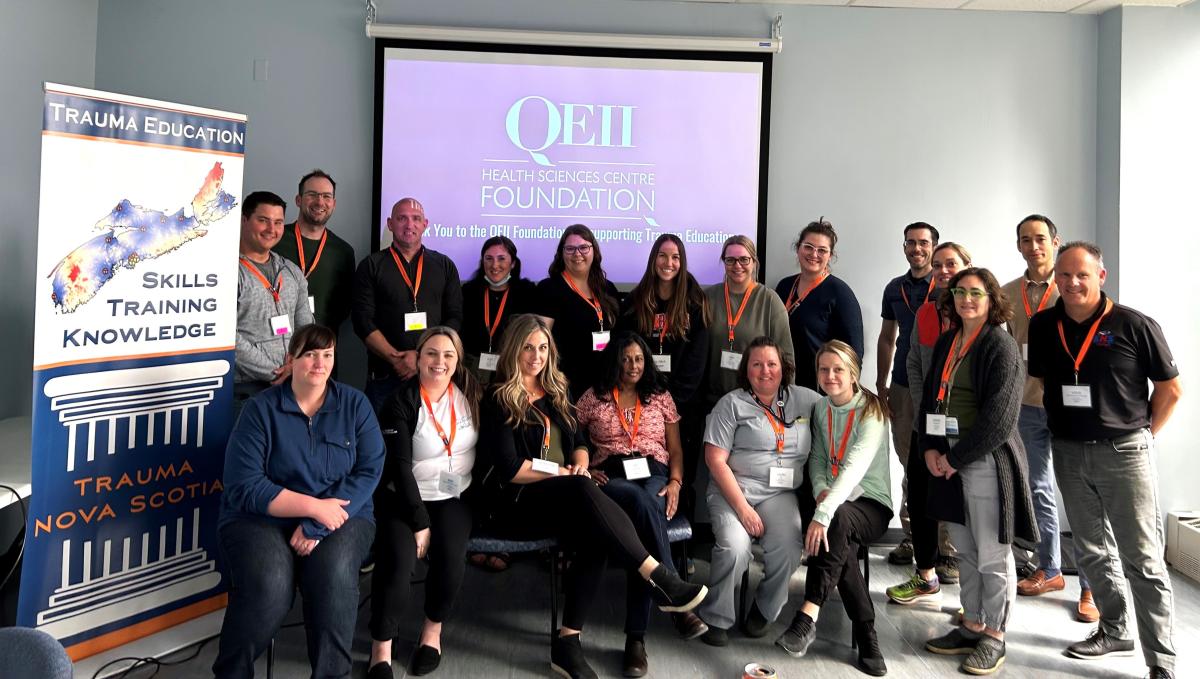
A group of participants who took part in a Trauma Nova Scotia training session.
Every day, a trauma occurs in Nova Scotia. Whether it's a motor-vehicle crash, a serious fall, or another life-threatening injury — and no matter where the accident happens in the province — patients are transferred to the QEII's Charles V. Keating Trauma and Emergency Centre for life-saving treatment and support.
But with 50 to 55 per cent of all traumas happening outside of Halifax, trauma care begins before the patient is transported to the QEII — Nova Scotia's primary trauma centre for adults. That's why equipping physicians and staff in regional and community health centres across the province with the training and expertise needed in trauma situations has an incredible impact on patient care and outcomes.
"The care a patient receives before they arrive at the QEII is just as important — or more important — than the care provided once they arrive. Patients have the best outcomes if they receive care from skilled clinicians before they are transported to the QEII," says Dr. Robert Green, a critical care and emergency physician at the QEII and senior medical director, Trauma Nova Scotia.
Trauma Nova Scotia provides province-wide leadership in injury prevention, education and research focused on trauma care.
With new funding support from the QEII Foundation, Trauma Nova Scotia can now offer courses to physicians and healthcare providers at health centres across Nova Scotia, ensuring they are equipped with the training and knowledge for trauma situations.
"One of the core missions of our program is to provide the best trauma care in Canada, right here in Nova Scotia. And part of that is education. We know there's a craving from healthcare providers for high-quality trauma education," says Dr. Green.
The courses aim to improve the care that every trauma patient receives in any community in Nova Scotia.
DELIVERING TRAUMA TRAINING ACROSS NOVA SCOTIA
The courses see trauma experts from Trauma Nova Scotia and partners at Emergency Health Services (EHS) travel across Nova Scotia to deliver simulation training. So far, the course has been offered at Colchester East Hants Health Centre, St. Martha's Regional Hospital and Hants Community Hospital, with 54 physicians and healthcare providers participating.
"We're starting with the province's 10 regional centres first — because they have the highest volume of traumas — and then we will begin rolling out the training in community centres next year," says Dan Cashen, director and co-lead, Nova Scotia Health Trauma Program.
"We are being strategic in our training so that we are providing resources to regional centres who see a lot of trauma," he says, adding that Hants Community Hospital was one community centre selected first because the volume of traumas is comparable to regional centres.
The training courses are inter-professional with physicians, nurses, physicians' assistants, resident learners, paramedics and respiratory therapists taking part in simulation-based learning designed to meet the needs of each site.
"Having everyone together in the same room and understanding the volume of resources available through Trauma Nova Scotia is very important to increase comfort and confidence when dealing with trauma situations," Dan says.
He adds, "Based on participant surveys and feedback, we're learning that participants' comfort levels with trauma situations increase following the training. And that translates to better care for the patient.”
One participant, Samantha Lamplugh, an advanced care senior operations paramedic with EHS, shared that the hands-on practice led by trauma experts gave her more confidence to deal with a trauma situation.
LEADING THE WAY IN CANADA
Trauma Nova Scotia is an industry-leader in Canada in its design and approach to creating a program that works for the population it serves.
"We have other provinces reaching out to us about our training program and want to know how we built it," says Dr. Green. "We're extremely proud of what we're doing. I think health care has to speak to the nuances of the communities it is serving, which is what we strive to do."
Dr. Green says that the QEII Foundation's support has made it possible to take training 'on the road,' translating into better trauma care and patient outcomes in communities across Nova Scotia.
"This gift from the QEII Foundation is not a gift to our program — it's a gift to patients and clinicians across Nova Scotia. The program wouldn't be offered to the extent it is now if we didn't have the Foundation's support," says Dr. Green.
